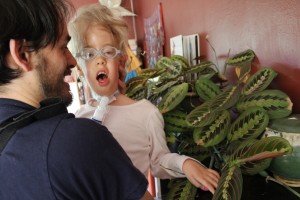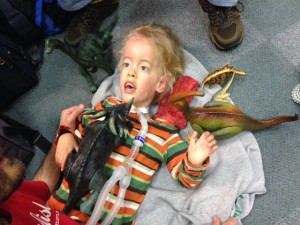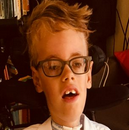Lucas is a funny guy (May 6)
 Lucas carried the momentum from all his spring break animal adventures into school over the last few weeks. He continues to make gradual progress with his power chair driving and is also learning to use a special iPad set up to be used as a assistive communication device. In classic Lucas style, he’s much more interested and amused by the idea of turning the communication program into a game, and especially loves stringing together long, repetitive, sometimes-garbled sentences and then playing them over and over again… all the while smiling proudly at his work and repeating the nonsense the device is spitting out, even hours later when we’re doing something different.
Lucas carried the momentum from all his spring break animal adventures into school over the last few weeks. He continues to make gradual progress with his power chair driving and is also learning to use a special iPad set up to be used as a assistive communication device. In classic Lucas style, he’s much more interested and amused by the idea of turning the communication program into a game, and especially loves stringing together long, repetitive, sometimes-garbled sentences and then playing them over and over again… all the while smiling proudly at his work and repeating the nonsense the device is spitting out, even hours later when we’re doing something different.
I’ve been thinking lately about some puzzling challenges and paradoxes in relation to Lucas’s behavior and development (this is Burke writing, by the way.) Now, I’m not a social scientist or anything so this is not based on any scholarly research about childhood development, or disability. Which is to say that I don’t really know what I’m talking about. But as Krista and I often find ourselves observing and talking about the weird, fascinating, and sometimes frustrating contradictions of Lucas’s personality, I figure its worth sharing a little…
One example is how Lucas relates to other people, especially in groups. To begin with, communication is difficult for Lucas because of the weakness related to his disability which makes it hard to be in a position to see what’s going on and then communicate about it, and also leads to him having a quiet voice, slurred speech, and a limited ability to carry on longer conversations. (Ok, that last one is an understatement, but we’ll get to that more later…) A few weeks ago Lucas went through a very tough stretch in terms of hanging out with other people. The low point for me was our attempt to take him out to a Jewish seder that a bunch of our friends had organized. It was such a great community event with lots of people who know Lucas and were excited to see him. But after about five minutes he was done, constantly on the verge of tears, demanding to go home, eventually agreeing to read books with the awesome childcare volunteer Mollie but still just barely holding on. A few minutes later, though we had to leave shortly after the program got started and it felt disheartening, for me at least. As soon as he got back in the van, Lucas was happy as could be.
Events like this had us talking and wondering – what is that frustrates Lucas about these interactions with other people? Is he starting to recognize the limitations of life with a disability? Maybe sometimes he just doesn’t have the energy and patience to try to communicate. Or is it just a typical phase for a kid his age, throwing tantrums when he doesn’t get his way (in this case he had made it clear from the beginning that he would have rather been at home reading books). It’s tough to know because Lucas doesn’t verbalize to us any of his emotions, or explain the reasons behind his desires. But he does get pissed when he doesn’t get his way.
Just when I start to wonder if we’ll ever be able to participate in a group activity with Lucas (other than going to the library, zoo or aquarium) he had a couple of great interactions. We had some friends from CISPES over for a “Education Night” involving some political readings, and though he preferred to watch Winnie the Pooh for the first part of the evening, we got him in his chair before bed and he proceeded to wow the crowd with his ability to spell the names of all the characters who roam the Hundred Acre Woods. He was so proud of himself, beaming as he belted out the letters, as if on the verge of winning the spelling bee. He had a few other great interactions in the ensuing weeks, including a poltluck at our house last Sunday and a service at the Valley and Mountain church in south Seattle. So we know that he can do it.
You can see the baffling contradictions of Lucas’s development at these moments. On one hand, he’s keenly aware of people around him, repeating something that someone says a moment later – with the perfect intonation and in a way that makes it obvious that he knows he’s making a hilarious joke, and one that comes across as advanced for a four year old. Or, he’ll go through and name a type of insect that starts with every letter in the alphabet from A to Z (Harlequin cabbage bug anyone?) He can almost do it with dinosaurs too, incidentally. The point is, he’s a smart kid. But then someone asks him what he did at school that day and he can’t answer. Maybe it’s just that he’s refusing to answer, but the way he responds it seems like he genuinely doesn’t know. It’s kind of a mystery.
What I can say with certainly is that his cognitive development is not typical. We used to say that he has a physical disability but that mytubular myopathy does effect his mental development. But even though I still say it sometimes, I don’t actually think its true. Nor do I think he falls on the autism spectrum (though we have at times considered it). His development delays are pretty unique… something that deserves more description as I’m curious what other MTM parents (as well as parents of kids with other disabilities) have to say about it. People sometimes hear us describe this and try to minimize what we’re seeing, saying it’s no different than a typical four year old. The truth is, some of these things are regular-old-kid behavior… But we also see things that seem socially, emotionally, or cognitively unusual for a kid his age, and we want to acknowledge and even be curious about that part of Lucas, too.
The most obvious example is his continued insistence on using the second person to refer to himself – and conversely, the first person to refer to someone he’s talking to. So Lucas will say “you want to read a book!” or “you’re going to go to school today” when referring to upcoming activities that he plans to engage in. When we correct him he’ll say “I want to read a book” drawing out the “i” sound so as to emphasize the change. But then moments later he’ll be back to saying “you.” And whenever I do something funny that makes him laugh but that he doesn’t totally understand he’ll say “What did I do??”, meaning, of course “what did daddy do?” It’s our own fault, in a way, because a few years ago when he started doing it we cracked up every time, thereby reinforcing the behavior, especially since Lucas loves to make a good joke. But now he’s months away from his 5th birthday and still doing it! Krista and I, as well as his nurses, are used to it, and we often correct him but sometimes just continue with the conversation. For others, its jarring and contributes to the challenge of communicating with Lucas, which already requires a lot of patience. His favorite way to answer a question is “you want me to tell you!” which is basically his way of saying “I don’t know” but literally means “I would like you to tell me the answer” with the pronouns reversed. Trying to explain this to the person who has just asked “what’s your favorite color Lucas?” is kind of like doing a rendition of “who’s on first.”
The “you want me to tell you!” refrain deserves special mention because it is the single phrase that Lucas most often says – by a longshot. I’ve started to think of it as an expression of his confusion – and perhaps, incipient frustration – with his disability. Lucas is prevented from doing so many things because of his extremely limited mobility, and I think that he’s starting to realize that and internalize the frustration that it leads to. The exasperation I sometimes hear in his voice when he says “you want me to tell you!” conveys that sense of immobility. It’s like he’s saying, “I have to ask you for everything else – books, game pieces, moving my arm when its stuck on the couch – so I might as well just get you to answer that stupid question for me too!!” Who knows, I’m probably reading too much into it, but there’s no doubt that oftentimes when he says “you want me to tell you!” he in fact has an answer to the question and chooses not to say it.
 As I’ve been writing this post over the last few days Lucas has been doing especially great. He’s just sooo happy sometimes, and his smile and joyful high-pitched voice at those moments is infectious. My parents and I took him to the Burke Museum on Sunday and after checking out the small dinosaur exhibit we spent nearly an hour playing with little plastic dinosaurs, and he was ecstatic. Then we picked up some dinosaur quiz cards from the bargain rack at the bookstore, and one of them asked “what’s the longest name of any land dinosaur?” The answer, of course, is Micropachycephalosaurus. I told Lucas that, he repeated it, and we went on to the next question. Later that night I asked him what the longest dinosaur name is – and without skipping a beat he said “Micropachycephalosaurus!” And this from a kid who still doesn’t use “I” when referring to himself. Go figure.
As I’ve been writing this post over the last few days Lucas has been doing especially great. He’s just sooo happy sometimes, and his smile and joyful high-pitched voice at those moments is infectious. My parents and I took him to the Burke Museum on Sunday and after checking out the small dinosaur exhibit we spent nearly an hour playing with little plastic dinosaurs, and he was ecstatic. Then we picked up some dinosaur quiz cards from the bargain rack at the bookstore, and one of them asked “what’s the longest name of any land dinosaur?” The answer, of course, is Micropachycephalosaurus. I told Lucas that, he repeated it, and we went on to the next question. Later that night I asked him what the longest dinosaur name is – and without skipping a beat he said “Micropachycephalosaurus!” And this from a kid who still doesn’t use “I” when referring to himself. Go figure.


Comments (3)
Kelly Ann beavers
September 1st, 2014 at 7:48 pm
Also, about the way you said sometimes he might not remember what he did at school that day—
I would attribute it to a unique experience of time/timelessness — a lot of people with unique egos or periods of egoless awareness experience time in a different way. It’s actually pretty incredible. I will try to write more about it in a longer piece and share it with you, and you can see if it resonates with your family’s interactions :)
Kelly Ann beavers
September 1st, 2014 at 7:39 pm
Burke, thanks so much for sharing this. It inspires me to write more of a piece I’m working on about children like Lucas who live with what I call magical aptitudes.
I met you with Krista at Boundless, more than once, but at an art gallery event I recall specifically. Anyway, I wanted to chime in with this- my sense energetically of these sweet children is that they are born with a sense of ego which we (mere mortals like you and I) likely only partially glimpse. They feel the experiences of other people around them, in a subtle way, and they understand their interconnection to these experiences, only they don’t understand the idea that they are separate in the same way you or I do. Or even if they mentally “know” their separateness, they still physically “feel” more union. I won’t make this a mile-long comment, but suffice it to say that organizing bug and dinosaur breeds, then, (impressive btw), is a cognitive cinch for them, but comprehending the need for polite niceties or bothersome distinctive pronouns to establish identity in group settings is pure poppycock. I find it refreshing, frankly. I will be sending him healing thoughts for his leg. And gratitude for his reminding me that I am also “you.” I really honor and enjoy that.
Tio Sha
May 7th, 2014 at 3:11 pm
Burke, you hit the nail on the head with this one! This is a great description of the particular challenges and curiosities and delights of communicating with Lucas. Also, you make it clear where he gets his sense of humor from — you and Krista have always supported and echoed back his hilarious wit and humor and you also have a bunch of it yourselves. I don’t have much to share because Lucas is the closest relationship I have to a kid with disabilities, but I just wanted to chime in and say that over the past couple years as his language and verbal communication has expanded I’ve also often noticed that his “you want me to tell you” clearly has deeper meaning than just “tell me the answer at this moment”, and it’s been a good lesson for me to not respond with that by telling him the answer but instead figuring out another way to ask the question or to give him a different prompt. Or sometimes to take it as a cue that it’s time to change activities. Anyway, thanks for sharing some deeper thoughts on the mysterious Lucas Camilo Stansbury Hanson! Miss you all.
Leave a reply